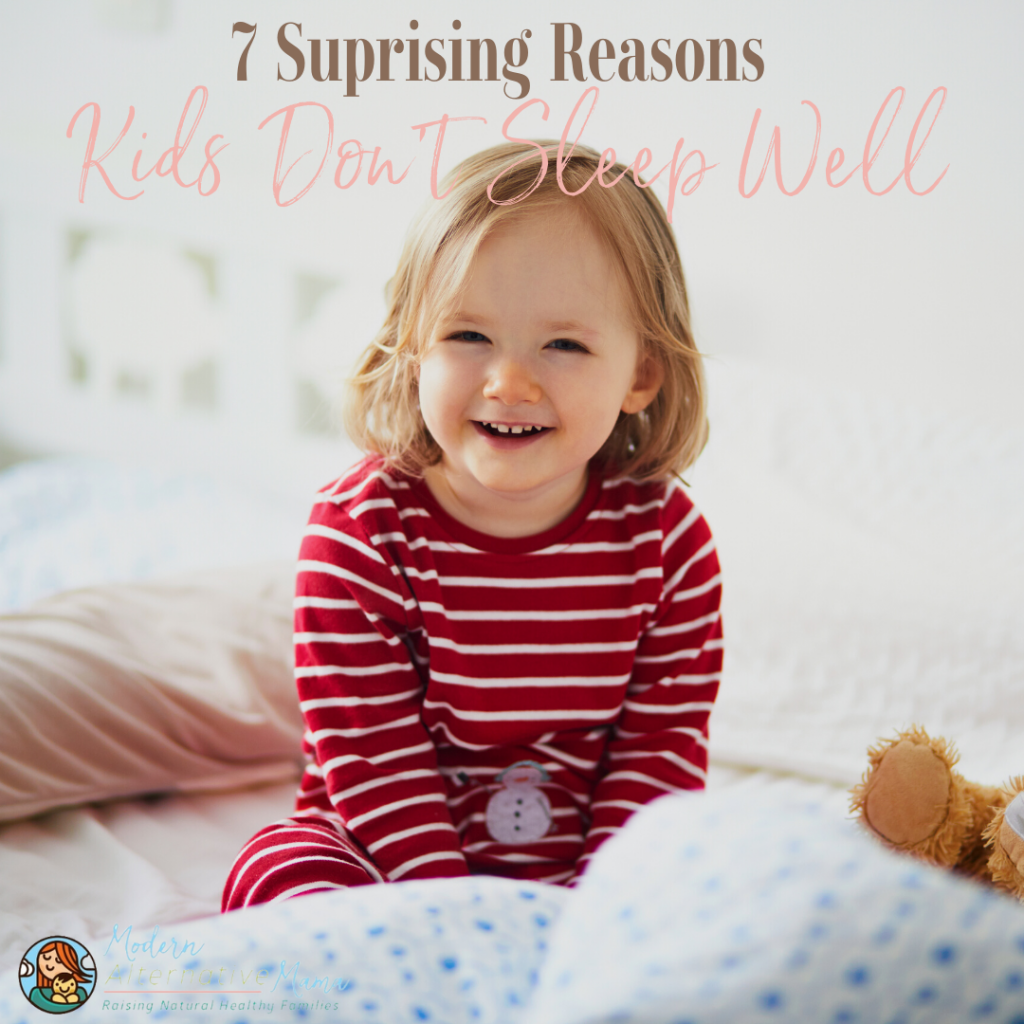Kids not sleeping well is a near-universal problem. On every parenting forum across the internet (and probably many doctors’ offices), there are parents saying “My kids don’t sleep well! What do I do?”
And inevitably, there is the usual advice: “Consistent bedtime routine. No screen time in the evenings. Let them know the day is over and you’re the boss.”
The problem is, this advice completely ignores that tired children want to sleep, and aren’t “being bad” or trying to drive their parents crazy. Instead, they’re actually struggling, and need help!
So what’s a tired parent to do?
The Real Reasons Kids Don’t Sleep Well
There are lots of potential reasons a kid might not sleep well, and we can’t cover them all here. If your child is sleeping fewer than 4 hours a night, has neurological symptoms, or other serious health issues, please see a doctor.
But if your child just fights bedtime or wakes more frequently than you’d prefer overnight…keep reading!
In most cases, poor sleep habits are not for the reasons most say — lack of bed time routine, parents not being “firm” enough, bad habits when waking. A lot of “experts” blame parents for wakings, and suggest they just need to let their children cry it out, or punish them, or that allowing kids out of bed or to sleep with them “created” the problem.
This is not true, though, in general.
So why don’t kids sleep?
#1: Need More Magnesium
We all need a lot of magnesium, because it’s a mineral that plays a huge role in muscle use, normal sleep, normal bowel function, and lots more. (See more on the importance of magnesium.) When we don’t get enough magnesium, sleep rhythms are interrupted. Usually this looks like struggles to fall asleep, a “twitchy” feeling in arms/legs, or waking at 2/3 AM for no real reason and struggling to fall back asleep. (source, source)
Since magnesium has so many important uses in the body, this is usually the first thing to try! The best way to do it via magnesium chloride topically — in a spray or lotion.
My favorite magnesium — GET IT HERE.
#2: Lack of Physical Activity
Sometimes, children struggle to sleep because they have too much energy pent up in their bodies. They are tired — but unable to relax enough to fall asleep. (In adults, a lack of physical activity could lead to a build up of sluggish lymph fluid, causing soreness around joints or lymph nodes. Upper arms, upper thighs, neck/shoulders.)
Get out for a walk or some play time during the day! Do it during mid-day sun for 10 – 15 minutes if possible, because that also addresses #7!
#3: Low Iron Levels
This one is really important. Anemia actually interferes with the brain’s sleep-wake patterns, and if not addressed, can impact sleep permanently. Iron is likely the issue if kids struggle to sleep because they feel twitchy in arms or legs, or if they wake often because their limbs move suddenly and startle them. Iron is also incredibly necessary for brain development, so this isn’t one you want to ignore. (source, source, source, source)
My favorite sources are dessicated beef liver pills (HERE) or herbal liquid (HERE).
#4: Stress
Yes, even kids can be stressed! Troubles at school, difficulties with siblings or parents, and much more can affect kids. Unfortunately, kids are experiencing stress, anxiety, and depression at younger and younger ages.
A diet change and/or removal of the stressors is the best plan of action here. Talk to teachers or friends to figure out what’s up and address the issue(s). Remove sugar, food dyes, and processed foods. Adaptogenic herbs can also improve the body’s response to stress and promote more restful sleep.
Lavender essential oil or clary sage essential oil may be beneficial here. Also, herbs like ashwagandha, catnip, or skullcap can improve the stress response and promote more restful sleep.
Try my favorite herbal remedies HERE (any age) or HERE (older kids).
#5: Low Zinc Levels
This is a newer one, but zinc levels have been linked to sleep regulation. Higher consumption of zinc in the diet has been shown to improve sleep quality. If kids aren’t eating meat, nuts, or beans (and nuts/beans have to be properly soaked in order to get rid of the phytic acid so they don’t block zinc absorption), they can become deficient.
All we know right now is, zinc is important! Zinc deficiency is also related to ADHD. (source, source, source)
Include more zinc-rich foods, especially meat. Dessicated liver pills are good (HERE).
#6: Gut Health Issues
Unsurprisingly, the gut is connected to everything! Poor gut health can lead to poor sleep. (Which is likely because poor gut health leads to both pain — disturbing sleep — and various vitamin/mineral deficiencies, which also affect sleep.)
Including probiotic foods in the diet is important, and will promote better gut health over time. (Foods are better than supplements, here’s why.)
Diet changes, including avoiding sugar, refined white flour, synthetic B vitamins, and polyunsaturated oils are important here.
#7: Need More Vitamin D
Vitamin D is yet another nutrient that affects sleep! It’s actually a pre-hormone, and helps the body to make the hormones it needs to regulate the sleep-wake cycle. Many people aren’t getting enough, because they avoid the sun or use sunscreen (which blocks the rays that create vitamin D in the skin), and it isn’t found in many foods. (source, source, source)
The best solution is more sun (especially in the summer), but failing that, cod liver oil is a good solution. (My favorite one is HERE.)

What NOT To Do
Sometimes people want to treat sleep issues with things that are not a good idea…and are going to be more trouble than they’re worth in the long run.
#1: Melatonin
There are not a lot of long-term safety studies on it, and a lot of people who go on it, don’t get off of it. It can also cause day time sleepiness, stomach pain, and other side effects. While it may be useful in rare cases, these should be under the care of a medical professional.
#2: OTC Sleep Aids
These are usually habit-forming, which is not a good thing for anyone — but especially children. They don’t address the underlying causes of sleep problems; they just force a child to sleep anyway. Not what you want!
#3: Punish/CIO
This is many peoples’ response to especially babies and toddlers who don’t sleep well. They’re told that it’s just willful, manipulative behavior, and that parents just need to be very firm with their children. Tactics include carrying children back to bed repeatedly, refusing to pick them up when they cry, locking their doors, and in general ignoring them. Some recommend spanking toddlers who get out of bed.
In general, if a child is having trouble sleeping, there’s a reason why. They are not just deciding not to sleep to annoy you. Punishing them or ignoring them does not solve the underlying problem or meet the need. Once the needs are met, a tired child will sleep!
#4: Ignore It
Please don’t ignore ongoing sleep issues. While everyone had a bad night here or there, weeks or months or poor sleep mean there’s something more going on. Since these vitamin and mineral deficiencies can affect a lot more than sleep (including brain development, immunity, and physical growth), it’s best not to ignore it, but to figure out what’s going on and help! Poor quality sleep has a negative and lasting impact on both the child and the parents.
I hope this is helpful, for all you sleep-deprived families out there!








Tongue ties can also affect sleep.
Thanks Kate! I was thinking about what I wanted from my next Earthley order and you just hit the nail on the head
Hi I have a 6 month old (breastfed + some solids) baby and he was just waking up 1-2 times per night but now is waking up 4+ times per night and I don’t know what to do. Any suggestions? I wanted to try the herbals you recommended but can I use the “any age” one on the 6 month old? This article seems geared toward older kids.
Great article, THANK YOU!
Something I have noticed which also affects a child’s sleep, mainly nap-time, is sugar content in the diet as well as food dyes (mainly red color). I have lost count of how of many mothers have told me their child “stopped napping” around 2 years of age. What?! That is crazy. After years of pondering and observing these no-napping families my conclusion is sugar (which is usually combined with food dyes) is the main culprit.
I have 3 children under the age 10 and they have all had massive sleep problems until age 2 1/2 due to food intolerance issues causing tummy pain. This was super challenging to overcome since breastfeeding was a non-negotiable, but with A LOT of Colic Calm (homeopathic charcoal liquid for little ones), diet changes (for mom & babies), testing, probiotics, etc., they are all AMAZING sleepers now! My 2 oldest children took daytime naps until age 6, with the naps become more spaced out after age 5.
The sleep “musts” for our kids is:
1. very dark bedroom for sleeping time
2. Very cool temperature in bedroom for sleeping time
3. An air filter running during sleep time, mostly to muffle or cover
household and outside noises.
4.Comfortable cotton PJs for sleeping. Yes, I put all my babies in
“nap clothes/PJs” to help them get the best sleep possible 🙂
5. Stick to the same sleep and wake-up times (within 30 min) for
nights and naptime.
6. Have a routine before sleeping, it helps their brain to know sleep
time is coming. We just do potty/diaper change, wash hands, 1-2
stories, hugs/kisses, and into bed.
My almost 4 yo stopped napping at 2, and it was a struggle to even get her to nap that long. Even at this age, she rarely has refined sugar and I don’t think she has ever had food dye. I wish it was that simple. I did everything that was in your list, but she just wouldn’t nap anymore after turning 2. If she did ever happen to fall asleep in the car, bedtime would have to be moved back significantly because she just wasn’t tired enough to sleep.
All children are different. Naps are so helpful to us parents, but if the child is sleeping well at night, and getting plenty of rest for her little body, it may not be a concern that the nap being cut out. Most of mine cut out naps about the same time 🙂 Does she seem to stay asleep well during the night?
Literally everyone in our family who is biological (we have some adopted), dropped one of two naps before a year and all naps by 2, regardless of their sugar/dye consumption. Some of my nephews have never had sugar a day in their life as they have extremely strict diets due to allergies. I know very few kids who nap consistently past age 3.